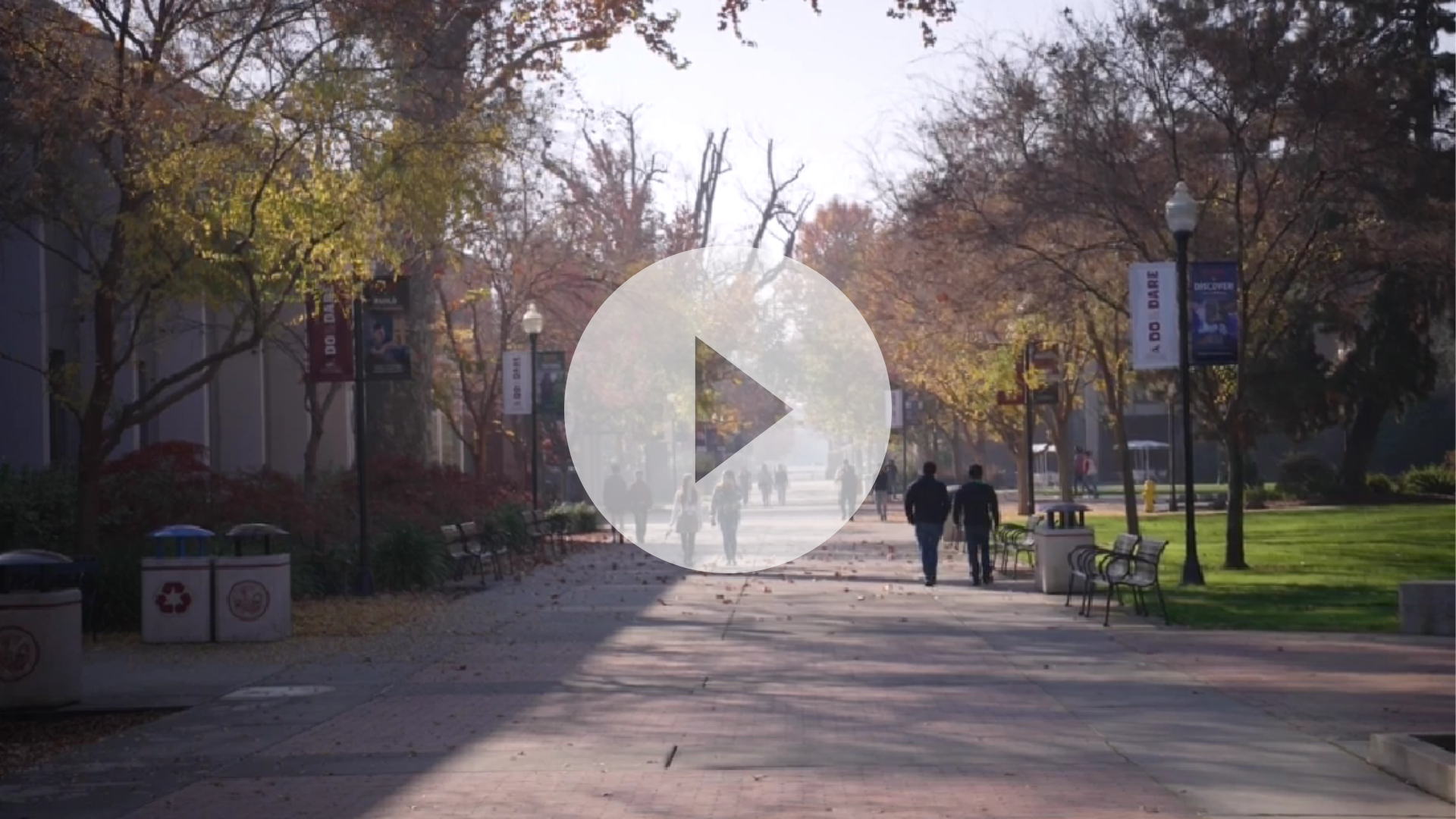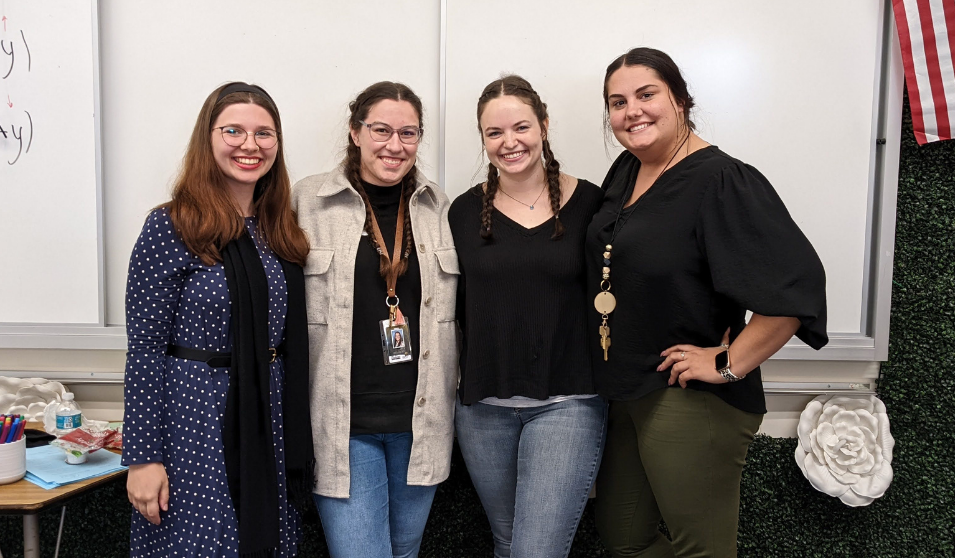California State University (CSU) – Chico, anchor of Rural Schools Collaborative’s (RSC) Northern California Hub in partnership with North State Together, has a well-established and exceptional model of a Rural Teacher Corps program called CLASS. The Computational Literacy Across Secondary Settings (CLASS) Program is an accelerated, supportive master’s degree pathway with a full-time, yearlong teacher residency. Participants in the program earn a master’s and teaching credential with a living stipend up to $36,000. It also allows them to co-teach with mentors in the classroom from day one.
This brief video gives a great introduction to the CLASS program, and a look at some of the incredible pre-service teachers embarking on their teaching journey:

You can learn more about the CLASS program and the wonderful work they are doing, by checking out their full docuseries, featuring "Resident and Mentor Pairs," "Behind the CLASS Program," "Advice from Alumni," and the "Tipping Point." Together, these short videos really capture the essence of the CLASS program.
We had the absolute pleasure of sitting down for a round table interview with Chloe Freeland-Davis (English), Mary Pagle (Science), Vanessa Chisum (Math), and Ashley Green (Special Ed), who are four exceptional young people in the CLASS program, doing their student teaching at Red Bluff High School. RSC has done several stories with Red Bluff High School over the years (see here), and with good reason. This school continues to be a responsive and innovative place for rural teachers and students, alike.
In our conversation, they underscored the importance of:
Living-stipends that allow them to focus on education completely
A cohort peers and veteran mentors to lean on for support
Hard work (and snacks and Starbucks)
Read more from our roundtable interview below:
On how they chose the CSU - Chico CLASS Program and the placement at Red Bluff:
Chloe: “I was especially interested in CLASS because it gives us the opportunity to do our credentialing and our master’s at the same time. I knew that pursuing my master's post-credential would be a challenge. There is also a stipend involved, so I was able to not have to work full time while also being a student teacher. I could fully devote myself to this.”
Mary: “I knew I wanted to do a credential program, and CLASS was a slam dunk. Why would I not?! It’s my master's and my credential, and I’m getting paid. Everything I did my last two years of undergrad was to get into the CLASS program. As far as the placement, I’m from Roseville [further south], so Red Bluff was not what I had planned at all, but I quickly realized we have a good group here, and I couldn’t imagine being placed anywhere else. It’s never where I thought I would end up, but here we are - and now I’m working here next year!”
Vanessa, “I went to Chico State and got my liberal studies bachelors. I thought I was going to be an elementary school teacher, but because of my financial situation, the credential just wasn’t in my future, and I saw no way to make it happen. So I moved away for a couple of years, just giving up on the dream of having a credential, and master's was never on my radar, until the pandemic came around and I realized I wanted stability. So, I looked for credential programs that would give you a living stipend because I knew I couldn’t do it without it. Then I was placed at Red Bluff and this year has been awesome – just a great math department to support me and coach me through the setbacks.”
Ashley: “As the special education one in the group, I have a very different experience with CLASS because I was the first cohort of the special education group. What drew me to it is I wasn’t sure how I wanted to specialize, but through the CLASS program I can get both as well as my master's. So, like others said, how could I not! And, like Mary, I will also be working here next year. Plus, the opportunity with the living stipend – you earn it without a doubt, but that’s what makes the CLASS program special and attract a lot of people”
On being matched with a co-teacher mentor and taking responsibility in the classroom:
Vanessa: “They [the CLASS program] are great at partnering people who should be partnered. Their interviewing process and selection process is so extensive that they really get to the heart of who each person is and match them so seamlessly. The co-teaching model is very challenging, there's no doubt about that, but if it's done right it can be such a stellar experience that really prepares us teachers for what we need to know.”
Mary: “My co-teacher and I, we click - We're the same person, we operate the same way… We have the same classroom management styles - anything that could have ever been an issue we agreed on. And it was so nice to be able to bounce ideas off of each other. You are in charge of the class periods. You'll be doing the content development. You will be doing the grading. You are the teacher- and I think that's such an effective way to do it. You have to be ready to hit the ground running.”
Ashley: “I’m also co-teaching with, not only my mentor teacher, but also in a general education history class. So I get to learn from yet another teacher. I have that backup who is there to show me different teaching styles. Because they are polar opposites! I've gotten a lot of experience with a lot of different teachers around here - Even if they're not my [assigned] mentor teacher.”
Chloe: “Ever since the first day of school, my mentor introduced the fact that I was going to be in the class by saying [to the students], ‘You all are lucky enough to have two English teachers this year’. So from day one, I really felt like those classes were my classes. I wasn't a guest in the classroom, I was there to teach. And the students really took their cues from him, so I've been incredibly grateful for the mentor pairing that I've had and for being in the department that I'm in.”
On managing the stress of the program, and the importance of the cohort model:
Mary: “It is not an easy program to get into. We come in with the understanding that this is going to be a lot of work. It is a master's and a credential in a year… That is wild. I don't think we all realized exactly how hard it was going to be - there have been many moments of what am I doing? Am I going to make it through this? It’s not an easy program, but we do have supports built in.”
Vanessa: “And the CLASS coordinators work really hard to make sure you don't feel isolated or alone. . . I do feel like I'm going to be able to succeed this semester. It is not for the weak, it is not for the fainthearted, but you will be supported the entire way in multiple capacities.”
Chloe: “I think one of the biggest supports for me during this program has just been you all [the other cohort members]. Having each other together, we're communicating constantly with the other people in our cohort. I don't think that this would've been manageable for me without that peer support.”
Ashley: “I know I couldn't do this without you all - we keep each other afloat. A lot of times when we get overwhelmed, we go talk to the group and they all support us... even if they don't know what we're talking about, they still all listen, and let us cry. We really, really lean on each other.”
On the perks of teaching in a small or rural school:
Mary: “I do have a lot of friends who teach in more urban areas, and when I tell them my experiences from here and how we're all so close, they do not have that same sense of community. That's something that's huge to me as a teacher - I want to feel supported. And our school places such emphasis on fostering that community. It's never, ‘this student is having a hard time - That sucks’. It's always, ‘This student is having a hard time. Let's find a way to support them’. Every single time. The intent is to support the kids and help them succeed, and not let anybody fall through the cracks.”
Ashley: “I’ll say it again. It's the whole community thing for me. All around the school, staff, students, even parents! It's just community.”
Chloe: “One of my favorite things is the way that people in this community show up for each other. It's not uncommon to get an email like, ‘Hey, this student has gone through this thing, who has these resources? Like there's been a fire, or they need clothes, they need food.’ And people show up - people actually contribute and actually make a direct difference for the people in their community. And I don't know that you get that same thing in more urban areas. It's one of the most astonishing things about working in a place like this, is just how people show up when others need them.”
Vanessa: “I'd say anyone who's looking for a team, go to a rural school. If you want to know what true community and true team teaching looks like, go work at a rural school. That’s exactly what you're going to see.”
CSU - Chico has been doing amazing work through their rural teacher program and corps, helping to prepare and launch the next generation of rural teacher-leaders. Before the CLASS program, there was the RISE program for rural teacher prep at CSU - Chico, and several RISE grads are now teachers at Red Bluff High, mentoring and paving the way for the next generation of excellent rural teachers:
“The best experience I had in the program was the support system. What keeps me inspired to continue teaching is knowing that I am making a difference in my student's lives not only as a teacher but as a person as well. The moment I hear from a student or a parent on how much of an impact I've made brings me joy and motivation to keep going.”
- Daniel Caravez CSU - Chico Alum and current Red Bluff High School Teacher
“The program gave me the knowledge, confidence, resources, and support needed to walk into a classroom as a first-year teacher and know that I could do it. The program also taught me to build a community around you and to learn from others- there's no shame in asking for help! I want to continue teaching because you can always improve and learn more. Now in my third year, it has been so exciting to watch my students grow and develop their individuality. I'm happy to have been a tiny part of that.”
- Kaitlyn Miller CSU - Chico Alum and current Red Bluff High School Teacher
Thanks to our partners, CSU - Chico and North State Together, for their incredible work in the Northern California region, and special thanks to the Red Bluff High School teachers and CLASS Coordinators for supporting RSC’s in-person visit.




